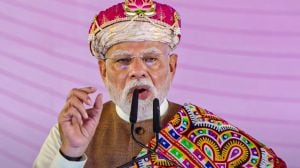Four yrs on,urban renewal scheme hit by states apathy
Despite the centrally sponsored reform-linked scheme for sprucing up local infrastructure in select cities under the UPA governments flagship Rs 50,000-crore Jawaharlal Nehru National Urban Renewal Mission....
Despite the centrally sponsored reform-linked scheme for sprucing up local infrastructure in select cities under the UPA governments flagship Rs 50,000-crore Jawaharlal Nehru National Urban Renewal Mission (JNNURM) for 65 cities,some state governments and city administrations have turned a blind eye,depriving citizens of better living conditions in the last four years since the scheme was launched.
The public-private-partnership model too didnt take off on expected lines,as only 65 of the total 477 projects are based on the PPP model a fact which was highlighted by Prime Minister Manmohan Singh at the national conference to celebrate the fourth anniversary of JNNURM.
Exhorting the mega cities to leverage the government funds available under the scheme to attract private investments,the PM said that the public-private partnership model should be encouraged. Only urban local bodies in good financial shape will be able to attract private investment or assistance from multilateral financial institutions. Both of these sources are indispensable for effective financing of the development of our cities, said Singh. States representatives have often raised concerns related to difficulties faced in procuring bank loans under some provision of the scheme and have demanded enhancing allocation to states and inclusion of more cities. However,their commitment when it comes to implementation of reforms is rather feeble.
While Singh said that the government will explore the possibility of more resources for the Mission in years to come,he insisted that the process of municipal reform needs to be deepened and evenly distributed across cities. They have to have the ability to design and implement large projects. They have to be sensitive to the needs of the urban poor, said Singh.
The scheme,divided into two major components Urban Infrastructure and Governance (UIG) and Basic Services to Urban Poor (BSUP) is administered by the Urban Development and Housing and Poverty Alleviation ministries respectively. Under the UIG component,the focus is on infrastructure projects relating to water supply and sanitation,sewerage,solid waste management,road network,urban transport and redevelopment of old city areas with a view to upgrading infrastructure,shifting industrial and commercial establishments to conforming areas. The second component focuses on integrated development of slums through projects for providing shelter and other civic amenities.
As per the latest official records,under the UIG component,the Central government has approved projects worth Rs 49,422 crore,pitching in Rs 23,406 crore with the rest to be met by state government and municipalities. Of this total amount,the Centre has till date released Rs 7,428 crore. One of the major reasons for such a low release is that most of the cities have failed to provide utilisation certificate required to claim the next installment of funds from the state,said an official.
Of the total 477 projects for which Centre gave its nod since 2005,only 43 have been completed. Urban Development Minister Jaipal Reddy said on Thursday that more than 80 per cent of the funds committed for the projects are for water supply,sewerage,drainage and solid waste management.
Some states and UTs like Andhra Pradesh,Arunachal Pradesh,Assam,Chhattisgarh,Gujarat,Haryana,J&K,Karnataka,Kerala,Maharashtra,Meghalaya,Orissa,Puducherry,Rajasthan,Tamil Nadu and Uttar Pradesh have been the star performers,having availed 80 per cent of the Central funds. The states which lag behind most,having claimed less than 20 per cent of the Central allocation are Chandigarh,Mizoram,Nagaland,Goa and Delhi.
Similarly,under the BSUP component of JNNURM,around 461 projects have been approved,with a total cost of Rs 25,250 crore,of which the Centres contribution is around Rs 12,756 crore. Of its total share,the Centre has released around 29 per cent of total funds in the last four years.
When it comes to the implementation of the reform agenda,the key reason behind introduction of the scheme,most of the states performed rather badly. Of the seven mandatory reforms at the state level,29 cities have repealed the Urban Land Ceiling and Regulation Act,13 have integrated water supply,10 have enacted community participation laws,11 have rationalised stamp duty,and seven cities have undertaken rent control reforms. Of the 65 cities,Surat,Ahmedabad,Greater Mumbai,Visakhapatnam have led the way,and even bagged awards at the fourth anniversary of the JNNURM scheme.
The pace of reforms has been disappointing and we have told the states that funds will not be forthcoming if reforms are not implemented , said a senior official.
Photos


- 01
- 02
- 03
- 04
- 05





























